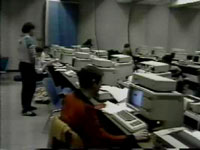 (Stanford U. Library)
(Stanford U. Library)This feature (the fifth in the "Evolution of a Computer" series) focuses on the Apple University Consortium, and Apple's hopes that the Macintosh will catch on among students and faculty.
 (Stanford U. Library)
(Stanford U. Library)
Voice-over: Walk onto the campuses of America's top colleges and universities, and you'll soon discover the role of computers in the educational community is growing by leaps and bounds. And this growth is bringing the computer industry an opportunity to directly help education reach heights and areas never realized before.
Steve Jobs: Education has always been really close to our heart. And one of the things we felt with Macintosh was that it was the perfect computer for college students. I think they're going to be as pervasive as calculators on college campuses.
 (Apple Computer logo)
(Apple Computer logo)
Voice-over: Therefore, the Apple University Consortium was born: a program designed to help improve the quality of education by placing Macintosh and other Apple computers on 24 major university campuses.
 (U. of Michigan computer laboratory)
(U. of Michigan computer laboratory)
The University of Michigan School of Engineering was one of the colleges that invested in the program to see that program realized.
University of Michigan representative: We're buying them at a very favorable discount. We expect to be able to equip essentially all 6,000 students with at least a Macintosh by the end of 1984.
 (Computer course)
(Computer course)
Voice-over: That means schools will be able to explore and widen their curriculum and define new educational applications. It will mean sharing new software with other schools in the consortium. And Apple hopes these opportunties will influence the entire educational community at large.
Apple representative: There's a lot of universities right now that are ready to make major commitments on personal computers over the next couple years. And it's been really important for us to establish a stronghold, particularly in the leading universities in the country. You know, we like to say what Stanford does today, Fresno State is going to do next year.
 (Scientist and Apple II user)
(Scientist and Apple II user)
Voice-over: That potential will provide Apple with an ever-growing library of applications for its computers. But according to Stanford's Michael Carter, the real winners will be the students.
Stanford representative: The benefits are easier access to computers, and through the promotion of educational software, a more powerful use of that tool in doing their homework assignments. Essentially, it becomes a better kind of educational instrument.
 (Workstation user)
(Workstation user)
Voice-over: It also becomes an instrument through which the benefits and discoveries of the Consortium, and Apple, are passed on to the world outside.
University of Michigan representative: We both feel that a synergism is going to come out of it, and that we will do good things for one another. And whether each one directly benefits is not terribly important. The community will benefit at large.